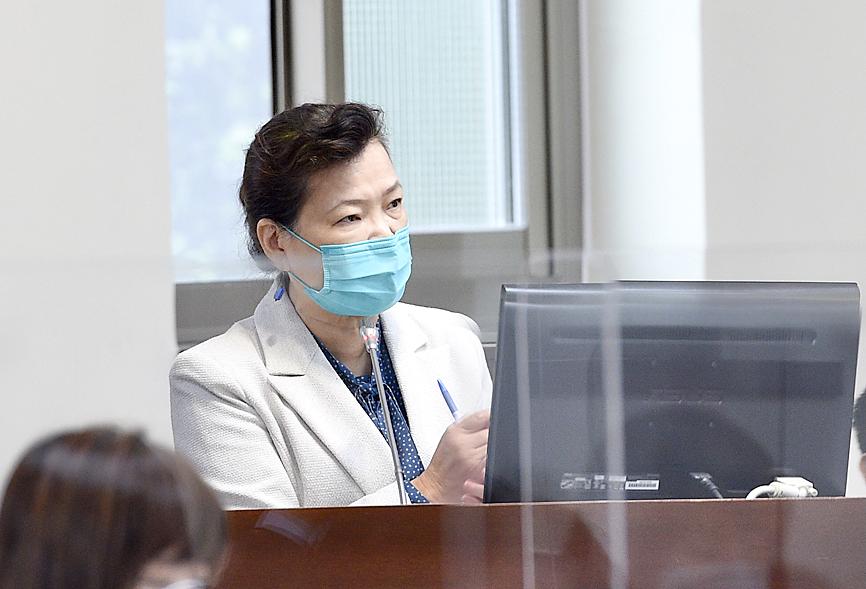The nation welcomes reshoring of Taiwanese manufacturers driven out of China by fears of economic coercion, Minister of Economic Affairs Wang Mei-hua (王美花) told reporters at the legislature in Taipei yesterday.
Wang’s remark came after China earlier this week fined Far Eastern Group (遠東集團) about NT$2 billion (US$71.94 million), accusing its subsidiaries of contravening environmental protection, land use, employee health, safety, tax and product quality regulations.
The ministry is in talks with the National Development Council (NDC) over whether the government would extend the three-year “Invest in Taiwan” initiative that started in 2019, Wang said.

Photo: Peter Lo, Taipei Times
The initiative provides reshoring businesses with favorable loan terms as well as assistance to secure factory sites and skilled labor. It is comprised of three programs that target reshoring businesses, companies aiming to deepen their roots in Taiwan, and small and medium-sized enterprises.
“Taiwanese businesses have told us that they would like the program to be extended,” Wang said.
“We will make a decision by the end of the year, as the government is keen to accommodate returning businesses,” she said.
NDC Minister Kung Ming-hsin (龔明鑫) on Wednesday said at the legislature that the initiative “would be extended as needed.”
Many Taiwanese businesses have already exited China amid a US-China trade dispute.
More recently, an unstable electricity supply in China has become another reason for companies to look elsewhere.
“Lately we have seen a spike in the number of businesses looking to take part in the initiative,” Wang said. “We encourage any company thinking about it to apply now.”
The latest data on the Invest in Taiwan Web site showed that 236 companies had been approved for the reshoring program, involving NT$910.7 billion in investments and creating 73,305 jobs.
The reshoring program is the biggest of the three parts of the initiative, the ministry said.
Overall, 1,061 companies have participated in the initiative, pledging investments totaling NT$1.14 trillion, the Web site showed.
To be approved for the initiative, companies must show that they are building highly automated, environmentally friendly and high-value-added businesses that create quality jobs in Taiwan, the ministry said.

INVESTIGATION: The case is the latest instance of a DPP figure being implicated in an espionage network accused of allegedly leaking information to Chinese intelligence Democratic Progressive Party (DPP) member Ho Jen-chieh (何仁傑) was detained and held incommunicado yesterday on suspicion of spying for China during his tenure as assistant to then-minister of foreign affairs Joseph Wu (吳釗燮). The Taipei District Prosecutors’ Office said Ho was implicated during its investigation into alleged spying activities by former Presidential Office consultant Wu Shang-yu (吳尚雨). Prosecutors said there is reason to believe Ho breached the National Security Act (國家安全法) by leaking classified Ministry of Foreign Affairs information to Chinese intelligence. Following interrogation, prosecutors petitioned the Taipei District Court to detain Ho, citing concerns over potential collusion or tampering of evidence. The

‘FORM OF PROTEST’: The German Institute Taipei said it was ‘shocked’ to see Nazi symbolism used in connection with political aims as it condemned the incident Sung Chien-liang (宋建樑), who led efforts to recall Democratic Progressive Party (DPP) Legislator Lee Kun-cheng (李坤城), was released on bail of NT$80,000 yesterday amid an outcry over a Nazi armband he wore to questioning the night before. Sung arrived at the New Taipei City District Prosecutors’ Office for questioning in a recall petition forgery case on Tuesday night wearing a red armband bearing a swastika, carrying a copy of Adolf Hitler’s Mein Kampf and giving a Nazi salute. Sung left the building at 1:15am without the armband and apparently covering the book with a coat. This is a serious international scandal and Chinese

Seventy percent of middle and elementary schools now conduct English classes entirely in English, the Ministry of Education said, as it encourages schools nationwide to adopt this practice Minister of Education (MOE) Cheng Ying-yao (鄭英耀) is scheduled to present a report on the government’s bilingual education policy to the Legislative Yuan’s Education and Culture Committee today. The report would outline strategies aimed at expanding access to education, reducing regional disparities and improving talent cultivation. Implementation of bilingual education policies has varied across local governments, occasionally drawing public criticism. For example, some schools have required teachers of non-English subjects to pass English proficiency

TRADE: The premier pledged safeguards on ‘Made in Taiwan’ labeling, anti-dumping measures and stricter export controls to strengthen its position in trade talks Products labeled “made in Taiwan” must be genuinely made in Taiwan, Premier Cho Jung-tai (卓榮泰) said yesterday, vowing to enforce strict safeguards against “origin laundering” and initiate anti-dumping investigations to prevent China dumping its products in Taiwan. Cho made the remarks in a discussion session with representatives from industries in Kaohsiung. In response to the US government’s recent announcement of “reciprocal” tariffs on its trading partners, President William Lai (賴清德) and Cho last week began a series of consultations with industry leaders nationwide to gather feedback and address concerns. Taiwanese and US officials held a videoconference on Friday evening to discuss the